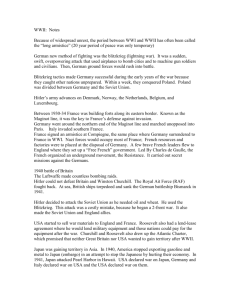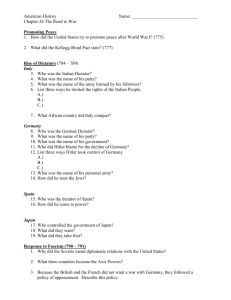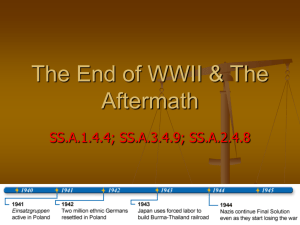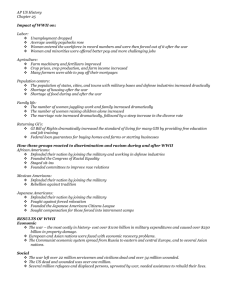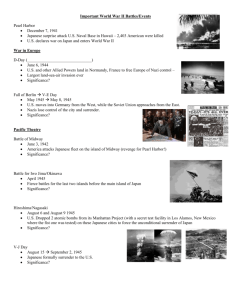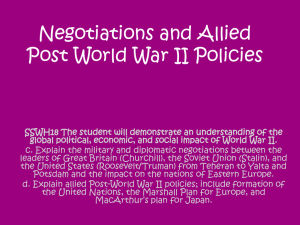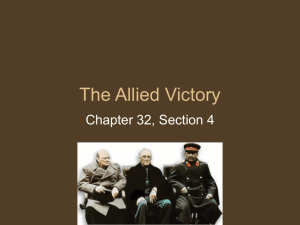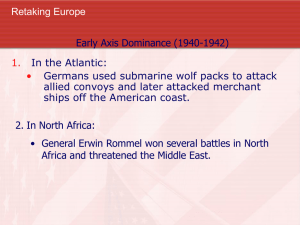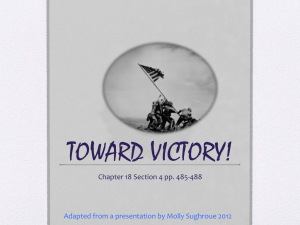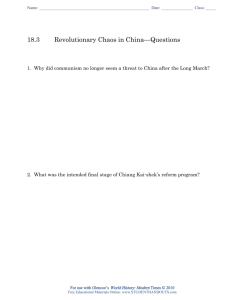FOREIGN RELATIONS, WORLD WAR II, KOREAN WAR, AND THE
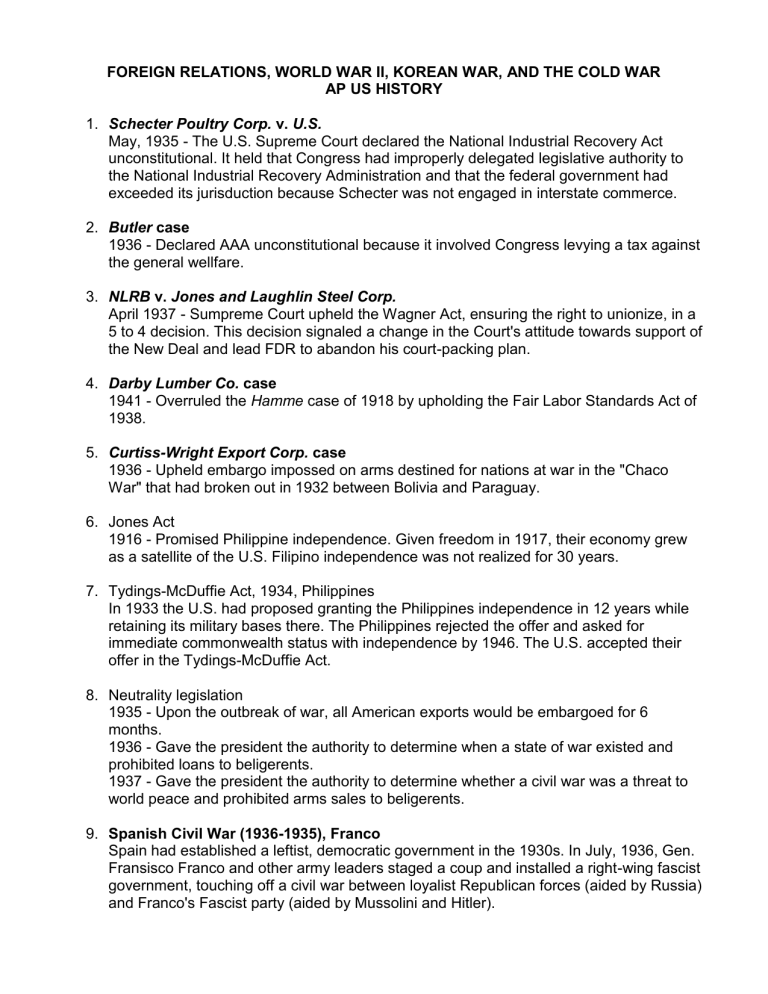
FOREIGN RELATIONS, WORLD WAR II, KOREAN WAR, AND THE COLD WAR
AP US HISTORY
1. Schecter Poultry Corp. v. U.S.
May, 1935 - The U.S. Supreme Court declared the National Industrial Recovery Act unconstitutional. It held that Congress had improperly delegated legislative authority to the National Industrial Recovery Administration and that the federal government had exceeded its jurisduction because Schecter was not engaged in interstate commerce.
2. Butler case
1936 - Declared AAA unconstitutional because it involved Congress levying a tax against the general wellfare.
3. NLRB v. Jones and Laughlin Steel Corp.
April 1937 - Sumpreme Court upheld the Wagner Act, ensuring the right to unionize, in a
5 to 4 decision. This decision signaled a change in the Court's attitude towards support of the New Deal and lead FDR to abandon his court-packing plan.
4. Darby Lumber Co. case
1941 - Overruled the Hamme case of 1918 by upholding the Fair Labor Standards Act of
1938.
5. Curtiss-Wright Export Corp. case
1936 - Upheld embargo impossed on arms destined for nations at war in the "Chaco
War" that had broken out in 1932 between Bolivia and Paraguay.
6. Jones Act
1916 - Promised Philippine independence. Given freedom in 1917, their economy grew as a satellite of the U.S. Filipino independence was not realized for 30 years.
7. Tydings-McDuffie Act, 1934, Philippines
In 1933 the U.S. had proposed granting the Philippines independence in 12 years while retaining its military bases there. The Philippines rejected the offer and asked for immediate commonwealth status with independence by 1946. The U.S. accepted their offer in the Tydings-McDuffie Act.
8. Neutrality legislation
1935 - Upon the outbreak of war, all American exports would be embargoed for 6 months.
1936 - Gave the president the authority to determine when a state of war existed and prohibited loans to beligerents.
1937 - Gave the president the authority to determine whether a civil war was a threat to world peace and prohibited arms sales to beligerents.
9. Spanish Civil War (1936-1935), Franco
Spain had established a leftist, democratic government in the 1930s. In July, 1936, Gen.
Fransisco Franco and other army leaders staged a coup and installed a right-wing fascist government, touching off a civil war between loyalist Republican forces (aided by Russia) and Franco's Fascist party (aided by Mussolini and Hitler).
10. Ethiopia
Mussolini invaded, conquering it in 1936. The League of Nations failed to take any effective action against Mussolini, and the U.S. just looked on.
11. Mussolini (1883-1945)
Fascist dictator of Italy from 1922-1943. Wanted to recreate the Roman Empire.
12. Japan attacks China, Chiang Kai-Shek
Chinese leader Kai-Shek defeated the Communists in China, sending them back to
Russia and instituting the Kuomintang government. Then in 1931, Japan seized
Manchuria from China.
13. Quarantine Speech
1937 - In this speech Franklin D. Roosevelt compared Fascist agression to a contagious disease, saying democracies must unite to quarantine agressor nations.
14. Adolf Hitler (1889-1945), Nazism
German facist dictator. Leader of the National Socialist Workers Party, or Nazis. Elected
Chancellor of Germany in 1933, he quickly established himself as an absolute dictator.
15. Munich Conference, appeasement, Neville Chamberlain
1938 - Hitler wanted to annex the Sudetenland, a portion of Czechoslovakia whose inhabitents were mostly German-speaking. On Sept. 29, Germany, Italy, France, and
Great Britain signed the Munich Pact, which gave Germany the Sudetenland. British
Prime Minister Chamberlain justified the pact with the belief that appeasing Germany would prevent war.
16. Austria annexed
March 12, 1938 - After the Austrian leader resigned under growing Nazi pressure,
German troops set up a government called the Ansehluss, which was a union of
Germany and Austria.
17. Nonagression pact between Germany and U.S.S.R.
August 23, 1939 - Germany and Russia agreed not to attack each other, which allowed
Hitler to open up a second front in the West without worrying about defending against
Russia. Granted Western Poland ot Germany, but allowed Russia to occupy Finland,
Estonia, Latvia, and Eastern Poland. Hitler intended to break the pact.
18. Invasion of Poland, Blitzkrieg
September, 1939 - Germany used series of "lightning campaigns" to conquer Poland.
The invasion caused Great Britain and France to declare war on Germany.
19. Axis Powers
A series of treaties in 1936 and 37 between Germany, Italy, and Japan created what was called the "Rome-Berlin-Tokyo Axis." The coutries were thereafter refered to as the Axis
Powers.
20. "Cash and carry" revision of neutrality
Stated the warring nations wishing to trade with the U.S. would have to pay cash and carry the goods away in their own ships. Benefitted the Allies, since German ships could not reach the U.S. due to the Allied blockades.
21. Fall of France
Summer, 1941 - Germany invaded France and set up the Vichey government, which lasted until the Allies invaded in 1944.
22. Isolationism, Charles Lindbergh
Lindbergh, known for making the first solo flight across the Atlantic, became politically controversial because he was an isolationist and pro-Germany.
23. Smith Act
Required fingerprinting and registering of all aliens in the U.S. and made it a crime to teach or advocate the violent overthrow of the U.S. government.
24. Tojo (Hideki)
Prime Minister of Japan (1941-1944) and leading advocate of Japanese military conquest during World War II.
25. Destroyer Deal
1940 - U.S. agreed to "lend" its older destroyers to Great Britain. (Destroyers were major warships that made up the bulk of most countries' navies.) Signaled the end of U.S. neutrality in the war.
26. "Lend lease" March 1941 - Authorized the president to transfer, lend, or lease any article of defense equipment ot any government whose defense was deemed vital to the defense of the U.S. Allowed the U.S. to send supplies and ammunition to the Allies without technically becoming a co-belligerent.
27. Atlantic Charter
August 1941 - Drawn up br FDR and Churchill with eight main principles:
Renunciation of territorial agression
No territorial changes without the consent of the peoples concerned
Restoration of sovereign rights and self-government
Access to raw material for all nations
World economic cooperation
Freedom from fear and want
Freedom of the seas
Disarmament of agressors
28. Pearl Harbor
7:50-10:00 AM, December 7, 1941 - Surprise attack by the Japanese on the main U.S.
Pacific Fleet harbored in Pearl Harbor, Hawaii destroyed 18 U.S. ships and 200 aircraft.
American losses were 3000, Japanese losses less than 100. In response, the U.S. declared war on Japan and Germany, entering World War II.
29. Japanese relocation
The bombing of Pearl Harbor created widespread fear that the Japanese living in the
U.S. were actually spies. FDR issued executive order 9066, which moved all Japanese and people of Japanese descent living on the west coast of the U.S. into internment camps in the interior of the U.S.
30. Bond drives
Celebrities and government representatives traveled around the U.S. selling government bonds ot raise money for the war effort. Extremely successful in raising funds.
31. War Production Board
Converted factories from civilian to military production. Manufacturing output tripled.
32. War Labor Board
Acted as a supreme court for labor cases. Did more harm than good when it tried to limit wages, which led to strikes.
33. Office of Price Administration (OPA)
Government agency which successful combatted inflation by fixing price ceilings on commodities and introducing rationing programs during World War II.
34. General Dwight D. Eisenhower (1870-1969)
Served as the supreme commander of the western Allied forces and became chief of staff in 1941. Sent to Great Britain in 1942 as the U.S. commander in Europe.
35. General Douglas MacArthur
Military governor of the Philippines, which Japan invaded a few days after the Pearl
Harbor attack. MacArthur escaped to Australia in March 1942 and was appointed supreme commander of the Allied forces in the Pacific. Recieved the Medal of Honor.
36. Genocide, "Final Solution"
Genocide is destruction of a racial group. Hitler's "Final Solution" was the genocide of non-Aryan peoples.
37. Second front
The Russians were suffering heavy casualties fighting the German invasion of Russia.
Stalin urged the Allies to open a "second front" in the west to relieve the pressure on the
Russians. The Allies did so, but only after a long delay.
38. D-Day
June 6, 1944 - Led by Eisenhower, over a million troops (the largest invasion force in history) stormed the beaches at Normandy and began the process of re-taking France.
The turning point of World War II.
39. Stalingrad
Site of critical World War II Soviet victory that reversed Germany's advance to the East.
In late 1942, Russian forces surrounded the Germans, and on Feb. 2, 1943, the German
Sixth Army surrendered. First major defeat for the Germans in World War II.
40. Winston Churchill
Prime minister of Great Britain during World War II.
41. Casablanca Conference
Jan. 14-23, 1943 - FDR and Chruchill met in Morocco to settle the future strategy of the
Allies following the success of the North African campaign. They decided to launch an attack on Italy through Sicily before initiating an invasion into France over the English
Channel. Also announced that the Allies would accept nothing less than Germany's unconditional surrender to end the war.
42. Cairo Conference
November, 1943 - A meeting of Allied leaders Roosevelt, Churchill, and Chiang Kai-Shek in Egypt to define the Allies goals with respect to the war against Japan, they announced their intention to seek Japan's unconditional surrender and to strip Japan of all territory it had gained since WW I.
43. Tehran Conference
December, 1943 - A meeting between FDR, Churchill and Stalin in Iran to discuss coordination of military efforts against Germany, they repeated the pledge made in the earlier Moscow Conference to create the United Nations after the war's conclusion to help ensure international peace.
44. "Unconditional surrender
It means the victor decides all the conditions the loser must agree to. The Allies wanted
Germany and Japan to agree to unconditional surrender.
45. Okinawa
The U.S. Army in the Pacific had been pursuing an "island-hopping" campaign, moving north from Australia towards Japan. On April 1, 1945, they invaded Okinawa, only 300 miles south of the Japanese home islands. By the time the fighting ended on June 2,
1945, the U.S. had lost 50,000 men and the Japanese 100,000.
46. Battle of the Bulge
December, 1944-January, 1945 - After recapturing France, the Allied advance became stalled along the German border. In the winter of 1944, Germany staged a massive counterattack in Belgium and Luxembourg which pushed a 30 mile "bulge" into the Allied lines. The Allies stopped the German advance and threw them back across the Rhine with heavy losses.
47. Manhattan Project
A secret U.S. project for the construction of the atomic bomb.
48. Robert Oppenheimer (1904-1967)
Physics professor at U.C. Berkeley and CalTech, he headed the U.S. atomic bomb project in Los Alamos, New Mexico. He later served on the Atomic Energy Commission, although removed for a time the late 1950's, over suspicion he was a Communist sympathizer.
49. Atomic bomb
A bomb that uses the fission of radioactive elements such as uranium or plutonium to create explosions equal to the force of thousands of pounds of regular explosives.
50. Hiroshima, Nagasaki
First and second cities to be hit by atomic bombs, they were bombed after Japan refused to surrender and accept the Potsdam Declaration. Hiroshima was bombed on August 6,
1945 and Nagasaki was bombed on August 9, 1945.
51. Yalta Conference
February, 1945 - Roosevelt, Churchill and Stalin met at Yalta to make final war plans, arrange the post-war fate of Germany, and discuss the proposal for creation of the United
Nations as a successor to the League of Nations. They announced the decision to divide
Germany into three post-war zones of occupation, although a fourth zone was later created for France. Russia also agreed to enter the war against Japan, in exchange for the Kuril Islands and half of the Sakhalin Peninsula.
52. Potsdam Conference
July 26, 1945 - Allied leaders Truman, Stalin and Churchill met in Germany to set up zones of control and to inform the Japanese that if they refused to surrender at once, they would face total destruction.
53. Partitioning of Korea, Vietnam, Germany
The U.S. played a role in dividing these countries into sections, each of which would be ruled by different authority figures and managed by one of the Allied powers.
54. Charles de Gaulle (1890-1970)
He formed the French resistance movement in London immediately after the French surrender at Vichy. He was elected President of the Free French government in exile during the war and he was the first provisional president of France after its liberation.
55. Winston Churchill (1874-1965), "Iron Curtain" speech
March, 1946 - He reviewed the international response to Russian aggression and declared an "iron curtain" had descended across Eastern Europe.
56. Joseph Stalin (1879-1953)
After Lenin died in 1924, he defeated Trotsky to gain power in the U.S.S.R. He created consecutive five year plans to expand heavy industry. He tried to crush all opposition and ruled as the absolute dictator of the U.S.S.R. until his death.
57. San Francisco Conference and U.N. Charter
1945 - This conference expanded the drafts of the Yalta and Dumbarton Oaks conferences and adopted the United Nations Charter.
58. United Nations: Security Council, General Assembly, Secretary-General
Only the Security Council could take action on substantive issues through investigation.
The General Assembly met and talked. A secretariat, headed by a Secretary-General, was to perform the organization's administrative work.
59. Atomic Energy Commission
Created in 1946 to oversee the research and production of atomic power.
60. Superpowers
The name give to the U.S.S.R. and the U.S. because of their dominance in the arms race and economic struggle for world power. Both countries had nuclear bombs by the late
1940's and 1950's.
61. Socialism, Communism
Socialism is the social theory advocating community control of the means of production.
Communism is the social system based on collective ownership of all productive property.
62. Satellites
Eastern European countries conquered by the U.S.S.R. during the Cold War.
63. Nuremberg trials
19 out of 22 German civil and military leaders were found guilty of "war crimes." 12 were sentenced to death, 3 to life sentences and the rest to five to twenty year sentences.
64. Department of Defense created
Headed by McNamara, it succeeded in bringing the armed services under tight civilian control.
65. Voice of America, CARE
Established in 1942 as part of the Office of War Information, since 1953 it has been the international radio network of the U.S. Information Agency.
66. Yugoslavia, Marshall Tito
An election was held in 1945 in which the moderate candidates were not allowed to run.
On November 29, 1945, the Federal People's Republic of Yugoslavia was proclaimed.
Following the adoption of a new constitution, the assembly reconstituted itself into a parliament. Tito was the Premier of the cabinet.
67. Czechoslovakian coup
1948 - Czechoslovakia succumbed to Soviet subversion. Although moderates and
Communists shared power after WWII, in 1947-1948, fearing a loss of popular support, the Communists seized control of the government and the moderates gave in to avoid civil war.
68. Containment, George F. Kennan
A member of the State Department, he felt that the best way to keep Communism out of
Europe was to confront the Russians wherever they tried to spread their power.
69. Truman Doctrine
1947 - Stated that the U.S. would support any nation threatened by Communism.
70. Marshall Plan
Introduced by Secretary of State George G. Marshall in 1947, he proposed massive and systematic American economic aid to Europe to revitalize the European economies after
WWII and help prevent the spread of Communism.
71. Point Four
Program proposed by Truman to help the world's backwards areas.
72. Israel created
1948 - In 1947 the UN General Assembly had approved the creation of a Jewish homeland by ending the British mandate in Palestine and partitioning it into two states: one Jewish and one Arab. On May 14, 1948, the Jews proclaimed the State of Israel, and all of the surrounding Arab nations declared war and invaded. After a short war, the
Israelis gained control of the country.
73. Berlin blockade
April 1, 1948 - Russia under Stalin blockaded Berlin completely in the hopes that the
West would give the entire city to the Soviets to administer. To bring in food and supplies, the U.S. and Great Britain mounted air lifts which became so intense that, at their height, an airplane was landing in West Berlin every few minutes. West Germany was a republic under Franc, the U.S. and Great Britain. Berlin was located entirely within Sovietcontrolled East Germany.
74. North Atlantic Treaty Organization (NATO)
Chartered April, 1949. The 11 member nations agreed to fight for each other if attacked.
It is an international military force for enforcing its charter.
75. Warsaw Pact
To counter the NATO buildup, the Soviets formed this military organization with the nations of Eastern Europe. Also gave Russia an excuse for garrisoning troops in these countries.
76. Collective security
An Article 10 provision of the League charter, it stated that if one country was involved in a confrontation, other nations would support it. Collective security is agreements between countries for mutual defense and to discourage aggression.
77. Fall of China, Mao Tse-Tung (Mao Zedong)
Mao Tse-Tung led the Communists in China. Because of the failure to form a coalition government between Chiang Kai-Shek and the Communists, civil war broke out in China after WWII. The Communists won in 1949, but the new government was not recognized by much of the world, including the U.S.
78. State Department White Paper
1949 - Set forth the State Department's efforts and future plans to stoop Communism.
With regard to China, it declared the historic policy of the U.S. to be one of friendship and aid to the Chinese people, which would be maintained both in peace and war.
79. Chiang Kai-Shek, Formosa
Chiang and the nationalists were forced to flee to Formosa, a large island off the southern coast of China, after the Communist victory in the civil war. Throughout the
1950's, the U.S. continued to recognize and support Chiang's government in Formosa as the legitimate government of China, and to ignore the existence of the Communist
People's Republic on the mainland.
80. Quemoy, Matsu
Small islands off the coast of China occupied by the nationalists and claimed by the
People's Republic. Late in 1954, the U.S. hinted at defending them because they were considered vital to the defense of Formosa, even though they were not expressly covered by the mutual defense treaty.
81. Korean War, limited war
After WWII, Korea had been partitioned along the 38th parallel into a northern zone governed by the Soviet Union, and a southern zone controlled by the U.S. In 1950, after the Russians had withdrawn, leaving a communist government in the North, the North invaded the South. The U.N. raised an international army led by the U.S. to stop the
North. It was the first use of U.N. military forces to enforce international peace. Called a limited war, because the fighting was to be confined solely to the Korean peninsula, rather than the countries involved on each side attacking one another directly.
82. Truman-MacArthur Controversy
Truman removed MacArthur from command in Korea as punishment for MacArthur's public criticism of the U.S. government's handling of the war. Intended to confirm the
American tradition of civilian control over the military, but Truman's decision was widely criticized.
